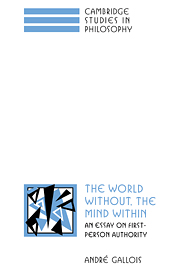Introduction
Published online by Cambridge University Press: 23 January 2010
Summary
There is, it seems, a striking asymmetry between our putative knowledge of what passes through our own minds, and our knowledge of what passes through the minds of others. In order to find out what someone else believes, fears, intends, hopes, wants or feels I need to consult that person's behaviour. I need to rely on such evidence to discover what is going through someone else's mind. Apparently, I do not need to rely on the same type of evidence to discover what is going through my own. At any rate, I do not need to rely on the same type of evidence to detect my own conscious psychological states.
A number of philosophers have discussed the putative asymmetry between the epistemic access we can have to our own psychological states and the epistemic access that others can have to them. Some of them have said that we enjoy first-person authority over our own psychological states. Here is how I propose to use the expression ‘first-person authority’. An individual I has first-person authority over psychological states of a certain type if and only if the following is a necessary truth. I can know that she is in a state of that type in an epistemically significant way in which no one else can know that I is in a state of the same type.
- Type
- Chapter
- Information
- The World Without, the Mind WithinAn Essay on First-Person Authority, pp. 1 - 12Publisher: Cambridge University PressPrint publication year: 1996
- 1
- Cited by



